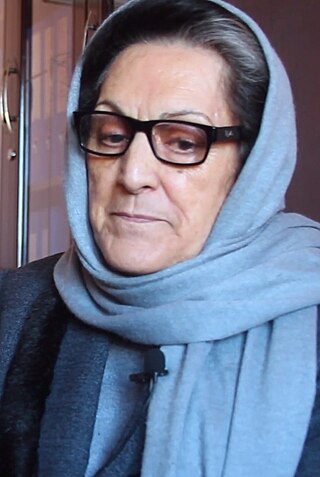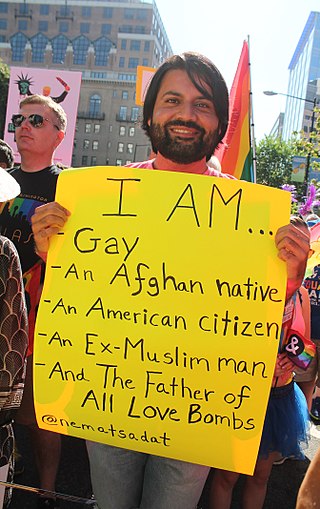
Horia Mosadiq is an Afghan human rights activist, political analyst and journalist. She has faced personal threats for her work as an activist and journalist. Mosadiq currently works for Amnesty International.

Horia Mosadiq is an Afghan human rights activist, political analyst and journalist. She has faced personal threats for her work as an activist and journalist. Mosadiq currently works for Amnesty International.
Mosadiq was a child when Afghanistan was invaded by the Soviets in 1979. [1] Mosadiq started studying journalism at Kabul University in 1992. [2] She was forced to stop attending college and left Afghanistan shortly after Najibullah's government was overturned. [3] She and her family sought refuge in Pakistan in 1995, where she worked in Islamabad as a journalist for United Press International. [2] Mosadiq eventually finished her master's degree in Public Relations from Berkeley University. [3]
After the United States and Britain invaded Afghanistan in 2002, she moved back to her home country and began working for Amnesty International in Kabul, which only stayed open until 2003. [2] After that, she did various jobs for different human rights agencies. [2] She also provided political commentary for Newsweek in 2004. [4]
Mosadiq began getting threats from those who did not like her activism. In 2008, Amnesty International helped her and her family moved to London where she started working for Amnesty International under a work permit visa. [5] Her husband had been shot at and her daughter's face slashed. [5] Mosadiq says that "As long as the threats were directed to me, I didn't care because when you decide what to do, you are also aware of the dangers. But when everything was directed against my family, it was quite difficult to see your family paying for what you do." [5]
Mosadiq currently works for Amnesty International as their Afghanistan Researcher. [6] She first started working for them in this capacity in 2008. [5] As a member of Amnesty International, she travels frequently between London and Kabul. [7] Mosadiq provided the research for the Amnesty International report, "Fleeing war, Finding Misery: The Plight of the Internally Displaced in Afghanistan." [8] She also reported to CNN news in an interview, that while human rights gains have occurred very slowly since 2002 in Afghanistan, Amnesty International has seen some progress over time. [9]

The treatment of women by the Taliban refers to actions and policies by various Taliban regimes which are either specific or highly commented upon, mostly due to discrimination, since they first took control in 1996. During their first rule of Afghanistan (1996–2001), the Taliban were notorious internationally for their misogyny and violence against women. Since 1996, women were mandated to wear the burqa at all times in public. In a systematic segregation sometimes referred to as gender apartheid, women were not allowed to work, nor were they allowed to be educated after the age of eight. Women seeking an education were forced to attend underground schools, where they and their teachers risked execution if caught. They were not allowed to be treated by male doctors unless accompanied by a male chaperone, which led to illnesses remaining untreated. They faced public flogging and execution for violations of the Taliban's laws. The Taliban allowed, and in some cases encouraged, marriage for girls under the age of 16. Amnesty International reported that 80 per cent of Afghan marriages were forced.
Human rights in Afghanistan have been violated by the Taliban administration since the Taliban takeover of Kabul in August 2021. The government has prevented most teenage girls from returning to secondary school education, and blocked women in Afghanistan from working in most sectors outside of health and education. Women have been ordered to wear face coverings in public, and barred from traveling more than 70 kilometres (40 mi) without a close male relative. In December 2022, the Taliban government also prohibited university education and primary education for females in Afghanistan, sparking protests and international condemnation.

Malalai Joya is an activist, writer, and a politician from Afghanistan. She served as a Parliamentarian in the National Assembly of Afghanistan from 2005 until early 2007, after being dismissed for publicly denouncing the presence of warlords and war criminals in the Afghan Parliament. She was an outspoken critic of the Karzai administration and its western supporters, particularly the United States.

Zakia Zaki was an Afghan journalist for the Afghan Radio Peace (Sada-i-Sulh) station north of Kabul, Afghanistan. Zaki was the first Afghani journalist to speak out against the Taliban after the US forces initiated the War in Afghanistan (2001–present), while she also championed other causes like gender equality and women's rights in Afghanistan.Her murder was seen as part of a series of recent attacks against high-profile Afghan women.

Women's rights in Afghanistan have oscillated back and forth depending on the time period. After King Amanullah Khan's attempts to modernize the country in the 1920s, women officially gained equality under the 1964 Constitution. However, these rights were taken away in the 1990s through different temporary rulers such as the mujahideen and the Taliban during the Afghan civil war. During the first Taliban regime (1996–2001), women had very little to no freedom, specifically in terms of civil liberties. When the Taliban were removed from power following the 9/11 attacks in the United States, women's rights gradually improved under the presidential Islamic Republic of Afghanistan. Women were de jure equal to men under the 2004 Constitution.
Galima Bukharbaeva is an Uzbek journalist known for her reporting on state authoritarianism and her eyewitness account of the 2005 Andijan massacre.
Gulnaz is an Afghan woman and rape victim. She was raped by her cousin's husband in 2009 and became pregnant. She was then charged with adultery, a crime in Afghanistan. She was initially sentenced to two years in jail, which was later raised to twelve, and she gave birth to a daughter in jail.
Rape is a major issue in Afghanistan. A number of human rights organizations have criticized the country's rape laws and their enforcement.

Farkhunda Malikzada, commonly referred to as Farkhunda, was a 27-year-old woman who was publicly lynched by a mob in Kabul, the capital of Afghanistan, on 19 March 2015. A large crowd formed in the streets around her claiming that she had burned the Quran, and for that, her accusers announced that she must be sent to Hell right away.
Kimberley Chongyon Motley is an American international human rights and civil rights lawyer. She is an attorney, author, entrepreneur, and former Mrs. Wisconsin-America 2004. Motley is the first foreign attorney to practice in Afghanistan since 2008 and was considered one of the most effective International Human Rights Attorneys and Defense Attorneys operating in Afghanistan.
Marzia Basel is a former judge in Afghanistan. During the rule of the Taliban, she secretly educated women in her own home. She is also the founder of the Afghanistan Progressive Law Organization.
Adela Mohseni is an Afghan women's rights activist.

Shafiqa Habibi is a journalist, television anchor, activist and politician from Afghanistan. She is known for her work to support women journalists, and for her 2004 candidacy for Vice President of Afghanistan as the running mate of Abdul Rashid Dostum.

Forced disappearance in Pakistan originated during the military dictator General Pervez Musharraf. The practice continued during subsequent governments. The term missing persons is sometimes used as a euphemism. According to Amina Masood Janjua, a human rights activist and chairperson of Defence of Human Rights Pakistan, there are more than 5,000 reported cases of forced disappearance in Pakistan. Human rights activists allege that the law enforcement agencies in Pakistan are responsible for the cases of forced disappearance in Pakistan. However, the law enforcement agencies in Pakistan deny this and insist that many of the missing persons have either joined militant organisations such as the TTP in Afghanistan and other conflict zones or they have fled to be an illegal immigrant in Europe and died en route.
Mina Mangal was a prominent Afghan journalist, political advisor, and women's rights activist.

Zarifa Ghafari is a former female mayor of Maidan Shahr, capital city of the Wardak Province, Afghanistan. Ghafari was one of the few Afghan female mayors, next to the first Afghanistan's mayor, Azra Jafari and Khadija Zahra Ahmadi, and was also the youngest to be appointed, at the age of 24. She is known for her efforts to advance women's rights in Afghanistan. Ghafari was chosen as an International Woman of Courage in 2020 by the US Secretary of State. She has survived three assassination attempts.

Nemat Sadat is an Afghan-American journalist, novelist, human rights activist, and former professor of political science at the American University of Afghanistan. Known for his debut novel The Carpet Weaver and his campaigning for LGBTQIA+ rights, particularly in the context of societal and cultural Islamic attitudes towards homosexuality in the Muslim world. Sadat is one of the first Afghans to have openly come out as gay and to campaign for LGBTQIA+ rights, gender freedom, and sexual liberty in Afghanistan.
Protests in Afghanistan against the Taliban started on 17 August 2021 following the Fall of Kabul to the Taliban. These protests are held by Islamic democrats and feminists. Both groups are against the treatment of women by the Taliban government, considering it as discriminatory and misogynistic. Supported by the National Resistance Front of Afghanistan, the protesters also demand decentralization, multiculturalism, social justice, work, education, and food. There have been pro-Taliban counterprotests.
Zahra Joya is a Hazara journalist from Afghanistan. She is the founder of Rukhshana Media, an outlet in Persian and English which she runs from exile.